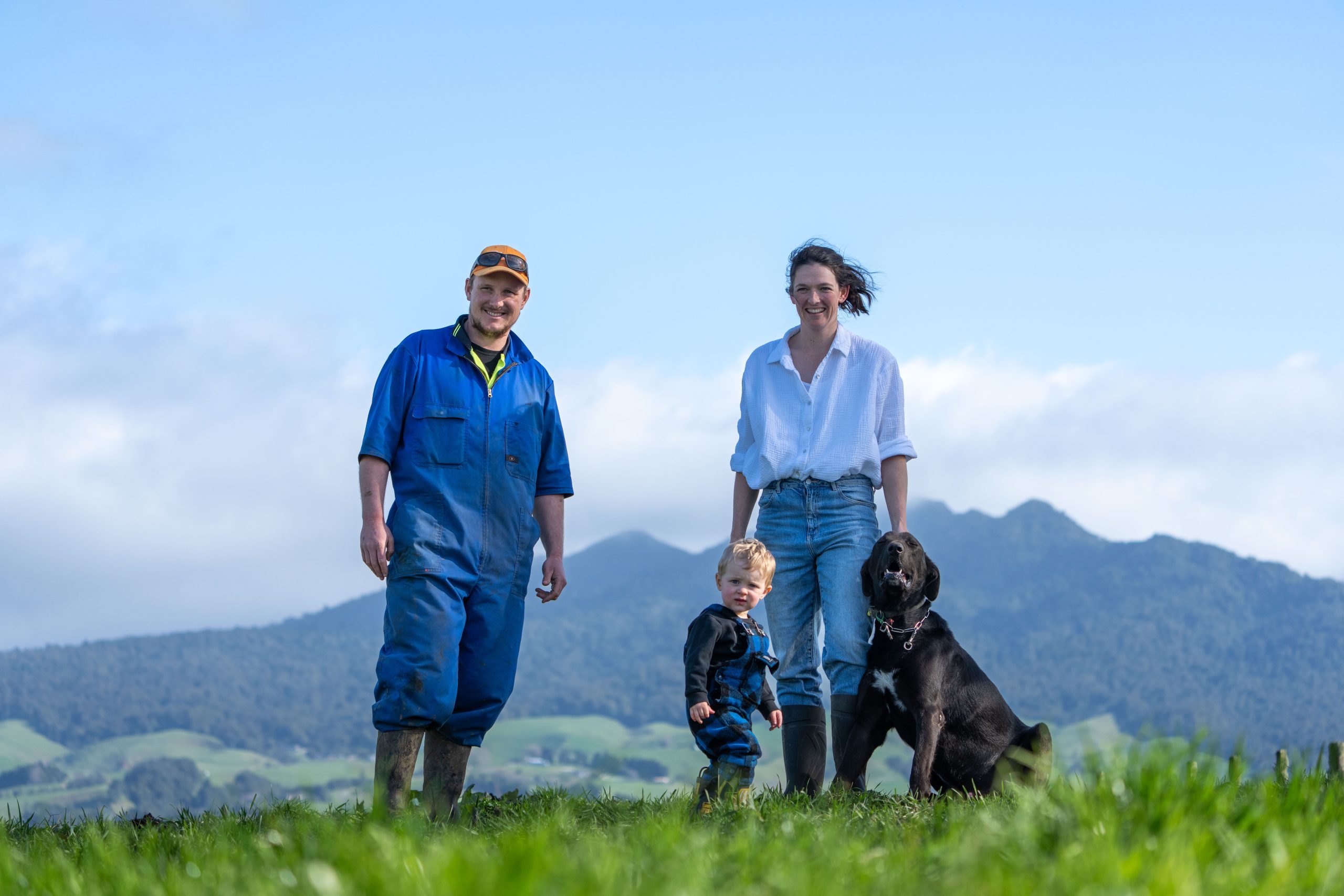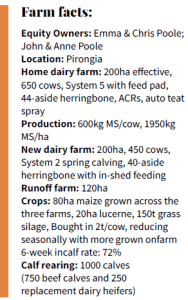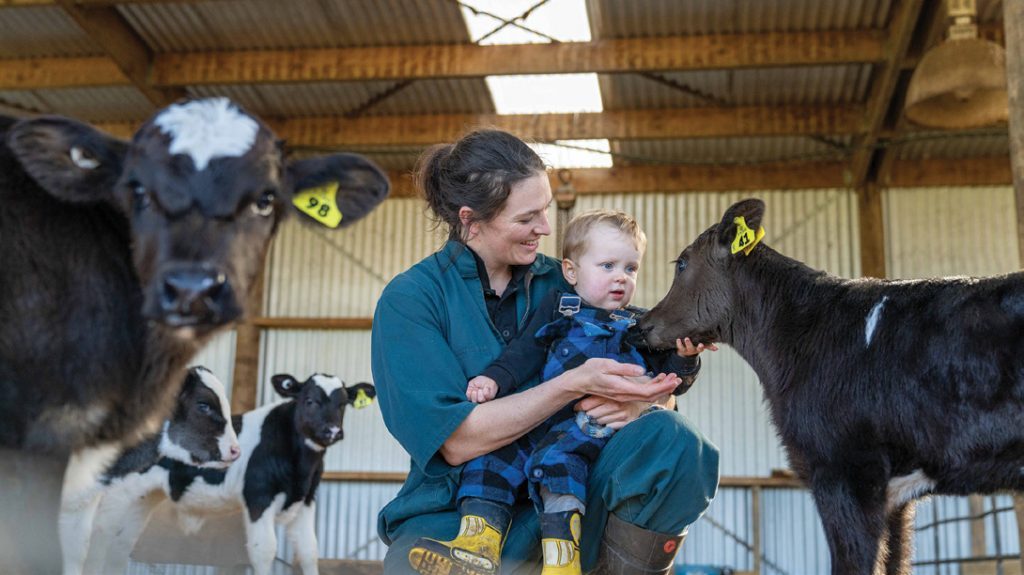Knocking through the grass ceiling
At 28 years old, Emma Poole is a trained veterinarian, an equity partner in two dairy farms plus a runoff and runs a 1000-calf rearing operation in Pirongia, Waikato. She also happens to be the first woman to win the NZ Young Farmer of the Year. Sheryl Haitana reports.

As the first woman to win the New Zealand Young Farmers Grand Final in the 55-year history of the competition, Emma Poole feels proud to be part of changing the narrative; where it is standard for women to win prestigious farming competitions, not the exception.
“We’ve finally knocked the grass ceiling off the roof,” Emma says.
She acknowledges the long chain of women who have worked hard to elevate the role women have in agriculture.
“All those women have given me the confidence to stand up and give it a go. I’m not the one who changed it, I’m just a product of the evolution, and there is still work to be done.”
It’s encouraging to see the rising numbers of women working in agriculture are starting to be represented by the number of women entering competitions like NZ Young Farmers, Emma says.
“A third of agricultural-related workers are female so in theory a third of the contestants should be female, 38% of the entrants this year were female, which is a significant portion.”
Straight into a partnership
 Emma and her husband Chris skipped sharemilking and went straight from contract milking into equity partnership with Chris’ parents John and Anne Poole. They bought into his family’s Pirongia dairy farm and runoff six years ago and the equity partnership has since bought a second dairy farm this year.
Emma and her husband Chris skipped sharemilking and went straight from contract milking into equity partnership with Chris’ parents John and Anne Poole. They bought into his family’s Pirongia dairy farm and runoff six years ago and the equity partnership has since bought a second dairy farm this year.
“We owe everything to John and Anne. They thought, ‘What’s the point of waiting?’ Their idea was if we were keen and wanting to be in a partnership, then do it now.”
John and Anne have been hugely supportive when the young couple have taken ideas to them, and they’ve encouraged them to give things a go, Emma says.
They are also hands-on helping with Emma and Chris’ 18-month-old son Beau to give the young couple the ability to get through their daily workload. Emma runs the calf-rearing operation while Chris oversees the dairy farms and John looks after the young stock on the runoff.
Emma also works part time as a locum dairy veterinarian two days of the week, along with doing 100% of the vet work across the three farms.
Emma, who grew up on a sheep and beef farm at Muriwai, always wanted to be a farmer and studying to be a vet was a way of understanding the animals more.
“Calving cows is my favourite thing to do. I’ve got quite long skinny arms, I’ve been told.”
Emma and Chris are focused on growing their business, whilst having a family and Emma admits, like many mothers, she is not averse to the guilt of trying to juggle it all.

“We are in such a cool growth phase with the business and we are riding that wave, but also making sure we make time for family.
“I really struggled with the sense of guilt especially when Beau was first born, with trying to find time for the business, for myself and Chris, and for Beau.
Any time away from him I felt like I was robbing him of time with me. I definitely struggled with daycare when I first took him there. There were lots of tears.
“That’s still a work in progress. I realise though, I have to be happy too to keep him happy and raise him well. Finding that balance is justified.”
Emma and Chris are focused on growing their business as well as ensuring they have future-proof systems. The home farm is a System 5 split calving operation, while the new dairy farm is System 2, traditional spring calving. The new farm is next door to their runoff, both just a 10-minute drive from the home farm which works well to shift stock between farms.
“I would call the home farm quite a complicated farm. There hasn’t been a normal year in five years. We are trying to head back to simplicity.
“But it’s complicated for a reason. By milking 365 days a year we are extracting everything out of it while we are young and trying to get ahead.”
They reduced cow numbers last year from 720 to 650 and are looking at dropping numbers again to 550.
“Because of the layout of the farm, there is a lot of walking. One of the aims of dropping cow numbers again would be that the cows would not have to walk to the furthest block and we could just grow crops there.
“We also want to reduce external feed imports and grow almost 100% of feed onfarm so we can be self-contained to ride the fluctuations in feed prices. The challenge there is growing feed that balances energy, protein and fibre, that’s why we have been increasing the lucerne in their diet.”
Split-calving works well on the home farm where they typically calve 450 cows in the autumn and 200 in spring. They have about 15-20% of cows who are extremely efficient doing an 18-month lactation.
They recently bought a 150-cow top genetic profile Friesian herd and cleaned out the bottom of their own herd.
“We are focused on breeding a compact Friesian, 520kg being the upper bodyweight limit, that is a more durable animal.
“Because this is an intensive system, we do have to be careful about what animals we buy in. When we find resilient cows it’s good to keep them in the herd.”
The last two seasons they have done 100% artificial insemination, but have gone back to using bulls this year.
“We didn’t have the technology of cow collars this year, so we wanted to make things simpler by putting in bulls. We also get quite a lot of use out of those same bulls between the autumn and spring herds.”
Dairy genetics are used for the first six weeks, followed by four weeks of bulls. Depending on the year and the season they mate for 8-11 weeks.
“We have minimised our bobby calves to about 2%.”
Emma and Chris have grown the calf-rearing operation to include 750 beef calves and about 250 dairy replacements. They typically put Hereford and Charolais across the cows and easy-calving Angus across the heifers. They also buy in about 150 Friesian bulls every autumn. All beef and bull calves are pre-sold in contracts at 105kg. They get up to about 11 mobs in the peak, being fed once a day. Calves get 750g pellets/day for 60 days and they aim for two bags of milk powder per calf. Lucerne is also an essential part of their calf-rearing operation, Emma says.
“It’s a great feed for the calves, developing their gut, it’s high in protein and they love it. “About 70 calves can polish off a 600kg bale in two days.
“With me being a vet, I’ve trialled a few different products, but we try to keep our cost per calf to a minimum to keep it profitable.”
Apart from two days at daycare while she is working as a locum, Emma typically has Beau in tow when she is out onfarm, whether it’s feeding calves, or vaccinating a herd.
“When we do have him with us onfarm, the challenge is keeping him safe. I’ve just learnt that things take twice as long.
“I do 100% of the vet work on the farms, we bought our own pregnancy scanner, and I also do all the metri checks and vaccinations.
“We are very prevention focused. We probably do more vaccines than most farmers, including salmonella, rotavirus, lepto. Rearing 1000 calves we can’t afford not to do those vaccines, they’re essential.”
The days are busy and Emma is glad she is quite organised.
“We cook about three meals at once to get ahead, and live off crock pot meals.
“John and Anne are a huge help, we couldn’t do what we do without them. John will often go past and take Beau for a ride in the truck delivering calves, or Anne will take him for the day.
“My mum and dad also come down a fair bit as well and help.”
Knocking the bastard off
Despite such a busy schedule, somehow Emma found time to train and study for the NZ Young Farmers contest. Emma had previously made the Grand Final in 2019 where she placed third and knew she wanted to give it one more go.
“You can only be in the Grand Final twice. We are hoping to have more children, so I thought this year was my last opportunity to give it a good go.”
Emma joined the Young Farmers club when she was at Massey University studying veterinary medicine. Chris was the chairman of the Massey University Young Farmers club and Emma was on the committee.
One year Massey didn’t have any competitors at the district NZ Young Farmer competition so Emma entered and came second and had to go to the regional finals where she placed fourth.
“I had no idea what I was doing. I was grossly underprepared. But I fell in love with the contest, it was awesome.”
She says she met some cool people and particularly some inspiring people who were out working in the agricultural industry.
Chris moved back to his family dairy farm at Pirongia and Emma later followed when she finished her degree and they both joined the local Te Kawa West Young Farmers club.
Emma’s brother Tim Dangen won the 2022 NZ Young Farmer of the Year, and Chris, who won the Waikato regional final in the same year, placed runner up to his brother-in-law in the Grand Final. Chris and Tim were a huge part of her preparation this year, Emma says. From helping quiz her, through to helping her upskill on things from shearing sheep to fencing or building.
Being a mother helped Emma go into this year’s competition with a more unflappable approach, she says.
“When you become a mum, the most important thing in your life is your child. Everything else becomes secondary to that, and so for me it’s changed how I view things and it’s made things even more enjoyable.
“It was cool to have Beau watching and yelling out ‘tractor’ every 10 minutes. He is my why.”
Having that attitude is so important in a contest that is designed to rattle you, she says.
Emma’s first task in the Agri Sports on Day Two of the Grand Final was to put a trailer on to a tractor, a job Emma does regularly at home, but she just couldn’t get the pin all the way through.
“It was so bad it was comical. I got the pin in first time, but couldn’t get it all the way in because of the tension. By the time I did it I was 15 minutes behind, Chris and Tim couldn’t even watch, they had walked away, and I’d thought ‘I’ve lost’, but I managed to pull it together, put the pin in and catch up.”
The key was being able to keep a cool head. Emma also puts her win down to some luck and life experience. For example one of the modules was to replace a broken part in a New Holland square baler.
“Years ago I was down the back of the farm with dad fixing a baler and it just came back to me.”
Emma didn’t place first in any of the modules during the Young Farmers Grand Final, but instead placed second in every single one. It was that consistency that won her the accolade and the $90,000 worth of prizes to go with it.
“I’m the Jill of all trades, master of none.”





